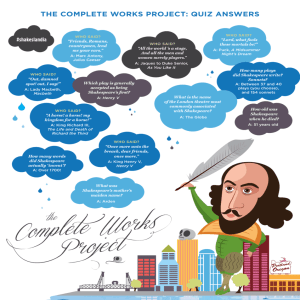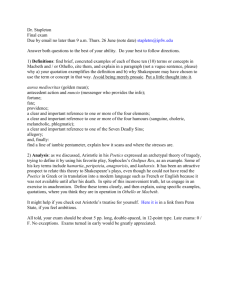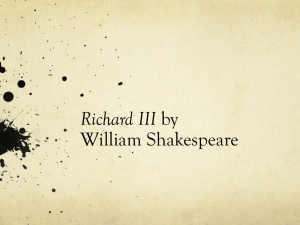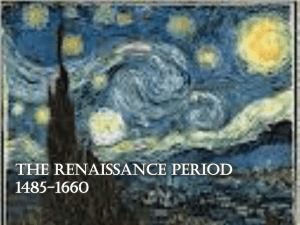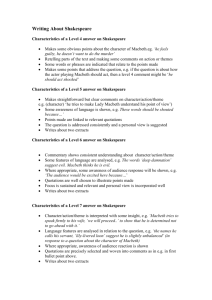Slide sem título
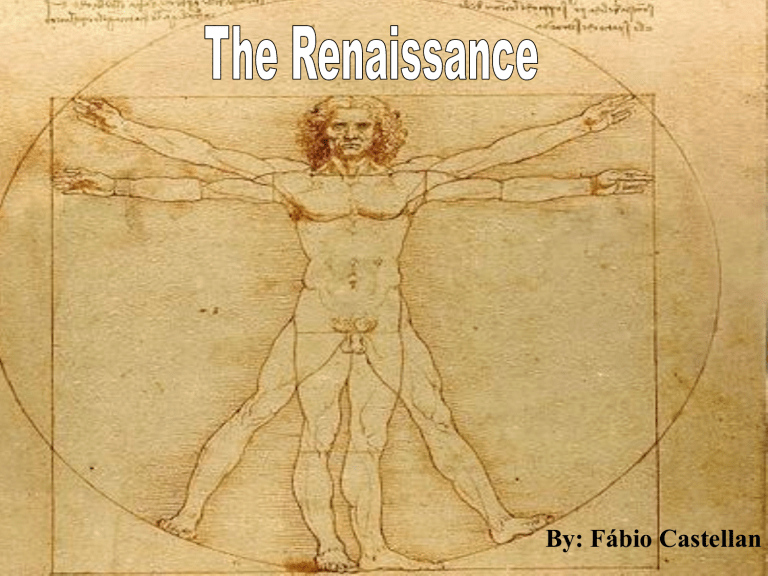
By: Fábio Castellan
Etymology:
The word “Renaissance” is a French word which means
“rebirth”.
The term was used to refer to the rebirth of learning caused by the discovery of hundreds of Greek and Latin manuscripts which had been lost during the Middle Ages .
Such texts made it possible for the artists of the Renaissance period to create a hole new vision of themselves.
Overview:
The Renaissance was a cultural movement that started in Italy and spread all over Europe.
It is considered to be the division between the Middle Ages and the Modern era.
The thinkers of this period, also called “humanists”, believed that the man should be the subject of study, and not God, as the
Church had taught during the medieval period.
Based on that, they began to investigate fields such as astronomy, anatomy, science and many others which had never been given much attention.
The Renaissance in England:
Tough it took many years for the “Modern” England to arise, even when it had established itself, many aspects of the medieval culture still remained side-by-side to the new order.
Nonetheless, two events in special stand out as a signal that things were indeed changing in the British Isles:
- The raise of the Tudor Dynasty
- The Printing Press
The Tudor Dynasty:
In 1485, a powerful nobleman named Henry
Tudor defeated the King Richard III in the Battle of Bosworth Field, bringing to an end a strife between noble families that last almost a century.
He was declared the new king and given the tittle of Henry VII. He then established the powerful Tudor Dynasty, an absolute monarchy which would rule Britain for over 100 years.
Henry Tudor, the King Henry VII
It made possible the flowering of England as a
European political power and as a center of literacy culture.
The Printing Press:
William Caxton was the person who introduced printing in England. Before that, the books were writen out in longhand, what meant a very slow jog.
With the printing, it was possible to produce books in large numbers and in a short amount of time. That way, more people could learn to read and write.
The oral tradition began to loose power, both in literature and in the Church affairs.
The Recuyell of the
Historyes of Troye, printed in 1473.
Humanism:
The new conception that the man had of himself encouraged the in various art styles: painting, literature, dance...
Leonardo DaVinci and Michaelangelo were the most notable, for their accuracy on representing the human anatomy and applying the laws of perspective to make their works more realistic.
The spirit of adventure also reigned in more practical matters: for example, the explorers such as Columbus and Cabral who ventured across the open sea to discover the new world of the Americas.
Thomas More: (1480-1535)
Thomas More was is considered one of the greatest of all English humanists, mainly for the book “Utopia”, written in Latin, in which were about an imaginary island where everything is perfect.
Utopia means “nowhere” in Greek;
Thomas new clearly that such an island could never exist. This dream of a place where happiness reigns and sorrow is banished is the most persistent of human fantasies and became a recurrent theme in many other British literature works.
Though he was recognized as a very important contributor for the humanism, he was later in 1535, beheaded for refusing to support his king’s ( Henry VIII ) decision to break away from the Catholic
Church.
In 1935, four hundred years after his death, he was canonized as a
“patron saint of politics”for fighting against the English Reformation.
The Reformation:
Henry VIII wanted to divorce his queen in order to marry Anne Boleyn.
Besides the pope refusal, he divorced anyway and married Anne.
He also confiscated all
Church property and proclaimed himself head of a new religion: Anglicanism.
This was one in a series of other “reforms” in Christianity which changed the the religious scenario of Europe.
This reformists Christians were called Protestants; they believed that
God’s Word should be found only in the Bible, instead of in the pronouncements made by popes in bishops.
So they undertook to translate the Bible from Latin to various other languages, so that it was available to everyone.
In 1604, King James I ordered forty-seven scholars to produce a translation of the
Bible to serve as the official one of the
Anglicanism, the so-called
“King James Bible”.
It was published in 1611 and is considered a masterpiece of English prose.
William Shakespeare: (1564-1616)
William is considered the greatest of all
English authors; his texts and plays are known worldwide and are updated constantly.
Though few is known about his life, he was born in the town of Stratford-upon-Avon and went to London when still young.
In 1611 - at the age of 47 - his plays already made success on the stages, so he retired to his native town.
Between the many plays and poems he wrote are:
Romeo and Juliet
A Midsummer Night’s Dream
Hamlet
Macbeth:
MACBETH: Wherefore was that cry?
SEYTON: The queen, my lord, is dead.
MACBETH: She should have died hereafter;
There would have been a time for such a word.
To-morrow, and to-morrow, and to-morrow,
Creeps in this petty pace from day to day
To the last syllable of recorded time,
And all our yesterdays have lighted fools
The way to dusty death. Out, out, brief candle!
Life's but a walking shadow, a poor player
That struts and frets his hour upon the stage
And then is heard no more: it is a tale
Told by an idiot, full of sound and fury,
Signifying nothing.
Macbeth’s speech reveals the astonishing quickness of Shakespeare’s mind, capable of expressing the strongest emotions and the deepest philosophical questions in a series of complex metaphors.
Macbeth compares life to a candle, then to a shadow, to an actor and finally to a story; this rapid shifting of metaphors is very characteristic of Shakespeare’s work.
Shakespeare’s knowledge of the human heart and his skill in expressing the heart’s mysteries are the bases of his genius.
Civil War and Revolution:
Aristocrats
(Landowners)
Supported Anglicanism
Supported the strong monarchy of King Charles I x
Commoners
(Merchants)
Supported Puritanism
Supported the Parliament to restrict the king’s power
The war ended in 1649.
The victory of the Parliament.
The execution of the King.
Britain was ruled no more by monarchy, but by a radical military dictatorship: the Commonwealth.
The Commonwealth was extremely strict, so the British asked for the dead king’s son to return from exile in France.
He became King Charles II
Both him and his successor, king James II believed in an absolute monarchy.
The middle class didn’t accept that.
The Parliament deposed
King James II in 1688.
The middle class had come to power to stay.
Questions for Discussion:
1. What was the significance of the invention of printing? Compare it with the invention of television.
2. What was the Renaissance? How did man’s view of himself change from the Middle Ages to the Renaissance?
3. What was the Reformation? How did it begin in England?
4. Why is the Bible so important for British literature?
5. What thoughts and feelings does Macbeth express in his speech?
What techniques does Shakespeare use to express them?
6. What were the two sides that opposed each other in the English
Civil War and Revolution?


